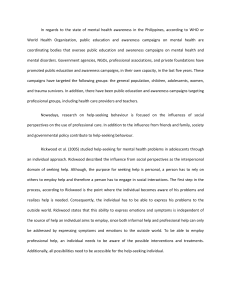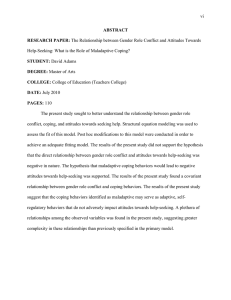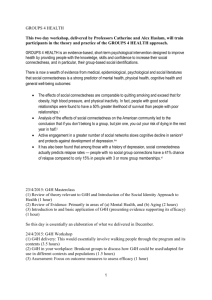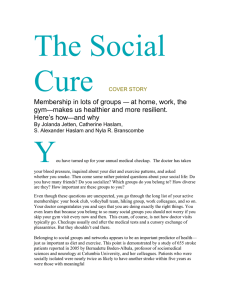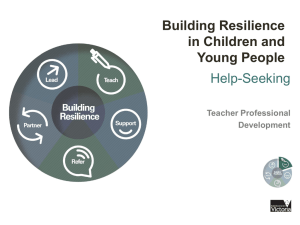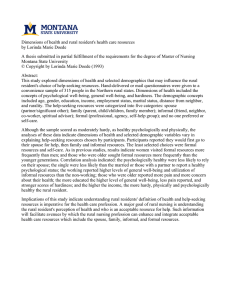Factors Influencing Help-seeking in Practising Counsellors Bethany Wilson and Dr Derek Heim
advertisement
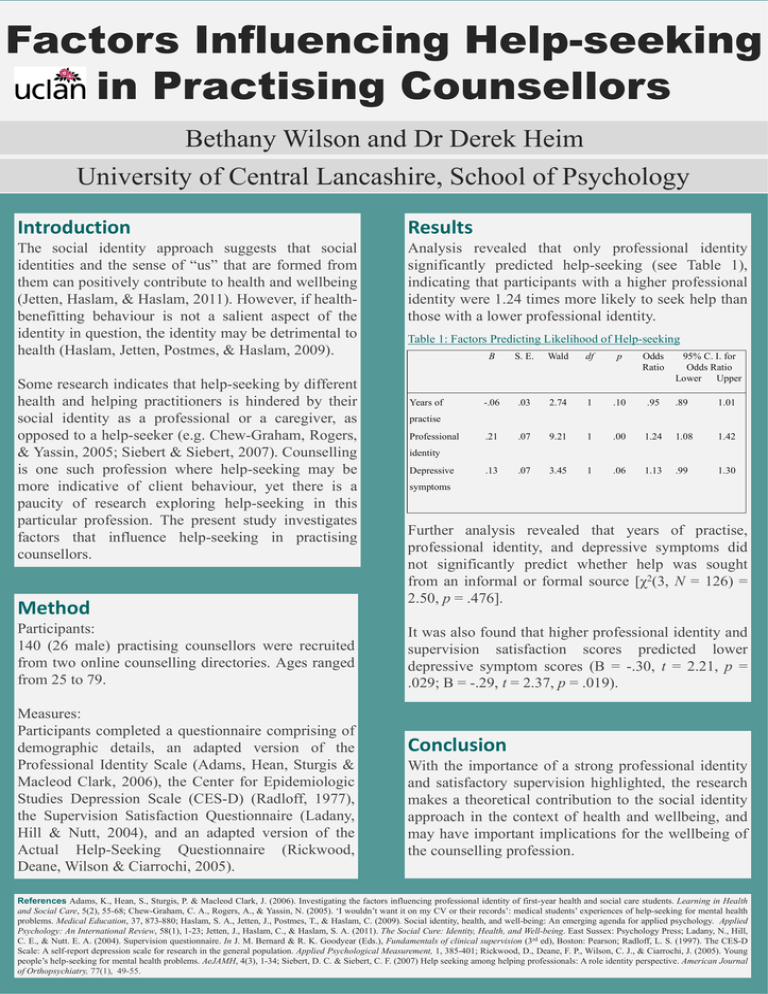
Factors Influencing Help-seeking in Practising Counsellors Bethany Wilson and Dr Derek Heim University of Central Lancashire, School of Psychology Introduction Results The social identity approach suggests that social identities and the sense of “us” that are formed from them can positively contribute to health and wellbeing (Jetten, Haslam, & Haslam, 2011). However, if healthbenefitting behaviour is not a salient aspect of the identity in question, the identity may be detrimental to health (Haslam, Jetten, Postmes, & Haslam, 2009). Analysis revealed that only professional identity significantly predicted help-seeking (see Table 1), indicating that participants with a higher professional identity were 1.24 times more likely to seek help than those with a lower professional identity. Some research indicates that help-seeking by different health and helping practitioners is hindered by their social identity as a professional or a caregiver, as opposed to a help-seeker (e.g. Chew-Graham, Rogers, & Yassin, 2005; Siebert & Siebert, 2007). Counselling is one such profession where help-seeking may be more indicative of client behaviour, yet there is a paucity of research exploring help-seeking in this particular profession. The present study investigates factors that influence help-seeking in practising counsellors. Method Participants: 140 (26 male) practising counsellors were recruited from two online counselling directories. Ages ranged from 25 to 79. Measures: Participants completed a questionnaire comprising of demographic details, an adapted version of the Professional Identity Scale (Adams, Hean, Sturgis & Macleod Clark, 2006), the Center for Epidemiologic Studies Depression Scale (CES-D) (Radloff, 1977), the Supervision Satisfaction Questionnaire (Ladany, Hill & Nutt, 2004), and an adapted version of the Actual Help-Seeking Questionnaire (Rickwood, Deane, Wilson & Ciarrochi, 2005). Table 1: Factors Predicting Likelihood of Help-seeking Years of B S. E. Wald df p Odds Ratio 95% C. I. for Odds Ratio Lower Upper -.06 .03 2.74 1 .10 .95 .89 1.01 .21 .07 9.21 1 .00 1.24 1.08 1.42 .13 .07 3.45 1 .06 1.13 .99 1.30 practise Professional identity Depressive symptoms Further analysis revealed that years of practise, professional identity, and depressive symptoms did not significantly predict whether help was sought from an informal or formal source [χ2(3, N = 126) = 2.50, p = .476]. It was also found that higher professional identity and supervision satisfaction scores predicted lower depressive symptom scores (B = -.30, t = 2.21, p = .029; B = -.29, t = 2.37, p = .019). Conclusion With the importance of a strong professional identity and satisfactory supervision highlighted, the research makes a theoretical contribution to the social identity approach in the context of health and wellbeing, and may have important implications for the wellbeing of the counselling profession. References Adams, K., Hean, S., Sturgis, P. & Macleod Clark, J. (2006). Investigating the factors influencing professional identity of first-year health and social care students. Learning in Health and Social Care, 5(2), 55-68; Chew-Graham, C. A., Rogers, A., & Yassin, N. (2005). „I wouldn‟t want it on my CV or their records‟: medical students‟ experiences of help-seeking for mental health problems. Medical Education, 37, 873-880; Haslam, S. A., Jetten, J., Postmes, T., & Haslam, C. (2009). Social identity, health, and well-being: An emerging agenda for applied psychology. Applied Psychology: An International Review, 58(1), 1-23; Jetten, J., Haslam, C., & Haslam, S. A. (2011). The Social Cure: Identity, Health, and Well-being. East Sussex: Psychology Press; Ladany, N., Hill, C. E., & Nutt. E. A. (2004). Supervision questionnaire. In J. M. Bernard & R. K. Goodyear (Eds.), Fundamentals of clinical supervision (3rd ed), Boston: Pearson; Radloff, L. S. (1997). The CES-D Scale: A self-report depression scale for research in the general population. Applied Psychological Measurement, 1, 385-401; Rickwood, D., Deane, F. P., Wilson, C. J., & Ciarrochi, J. (2005). Young people‟s help-seeking for mental health problems. AeJAMH, 4(3), 1-34; Siebert, D. C. & Siebert, C. F. (2007) Help seeking among helping professionals: A role identity perspective. American Journal of Orthopsychiatry, 77(1), 49-55.
